Dalian
| Dalian | |
| — Sub-provincial city — | |
| Chinese transcription(s) | |
| - Simplified | 大连 |
|---|---|
| - Pinyin | Dàlián |
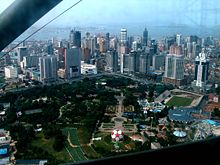 |
|
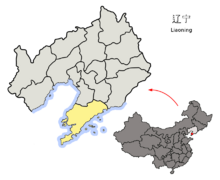 |
|
| Coordinates: | |
| Country | China |
| Province | Liaoning |
| City seat | Xigang District |
| Government | |
| - Mayor | Xia Deren |
| Area | |
| - Sub-provincial city | 13,237 km² (5,110.8 sq mi) |
| - Land | 12,574 km² (4,854.8 sq mi) |
| Elevation | 29 m (95 ft) |
| Population | |
| - Sub-provincial city | 6,200,000 |
| - Density | 468.4/km² (1,213.1/sq mi) |
| - Urban | 3,120,000 |
| Time zone | China Standard (UTC+8) |
| Postal code | 116000 |
| Area code(s) | 411 |
| GDP | ¥313.1 billion (2007)[1] |
| GDP per capita | ¥ 51,624 (2007)[1] |
| Coastline | 1,906 km (excluding islands) |
| License plate prefixes | 辽B |
| Website: http://www.dl.gov.cn | |
Dalian (simplified Chinese: 大连; traditional Chinese: 大連; pinyin: Dàlián; Japanese: Dairen; Russian: Далянь, Dalian or Дальний, Dalny) is the governing sub-provincial city in the eastern Liaoning Province of Northeast China. Dalian is China's northernmost ice-free seaport.
Contents |
Administration
Dalian is the second largest city of Liaoning Province, after Shenyang, the provincial capital. Dalian City is governed by the Mayor and its Dalian Municipal People's Government.
Past and present mayors
The current Mayor since 2003 is Xia Deren, born in 1955 in Dalian, a Ph.D. in Finance, former President of Dongbei University of Finance and Economics, Vice Mayor of Dalian City and Vice Governor of Liaoning Province. The former mayor is Li Yongjin, now the People's Representative of Dalian, preceded by Bo Xilai, later Governor of Liaoning Province and then the Minister of Commerce in the Central Government, and now the party chief of Chongqing. The Vice Mayors are Xiao Shenfeng, Dai Yulin,Sun Guangtian,Zhang Jixian,Qu xiaofeng,Zhang Jun and Zhu Chengqing.
Municipal Government
The Municipal Government is located in the main building on the north side of People's Square on Zhongshan Road, originally built as the Administrative Office of Kwantung Leased Territory, and other buildings in downtown Dalian. There are the Commerce, Foreign Economy & Trade, Hygiene, Information Industry, Police, Religion, Science & Technology, Transportation and other city-level bureaus, which work closely with the corresponding agencies at the district level.

The city administers 6 districts, 3 county-level cities, and 1 county.
Ganjingzi, Zhongshan, Xigang, and Shahekou Districts make up the urban centre. Changhai County is made up entirely of islands east of the peninsula. There are 74 sub-districts and 127 town/townships (11 of which are ethnic). (see Political divisions of China#Levels)
There are, in addition, 4 national leading open zones (对外开放先导区):
- The Development Zone (开发区)
- The Free Trade Zone (保税区)
- The Hi-Tech Industrial Zone (高新技术产业园区)
- The Golden Pebble Beach National Holiday Resort (金石滩国家旅游度假区)
| Pinyin | Hanzi | Area (km²) |
Population |
|---|---|---|---|
| Districts | |||
| Ganjingzi District | 甘井子区 | 491 | 540 000 |
| Lüshunkou | 旅顺口区 | 506 | 210 000 |
| Xigang District | 西岗区 | 26 | 330 000 |
| Zhongshan District, Dalian | 中山区 | 43 | 370 000 |
| Shahekou District | 沙河口区 | 49 | 600 000 |
| Dalian Development Zone | 开发区 | 329 | 300 000 |
| Jinzhou District | 金州区 | 1390 | 660 000 |
| Cities | |||
| Wafangdian | 瓦房店市 | 3791 | 1 030 000 |
| Pulandian | 普兰店市 | 2923 | 820 000 |
| Zhuanghe | 庄河市 | 3866 | 900 000 |
| County | |||
| Changhai | 长海县 | 152 | 90 000 |
Geography

One of the most heavily developed industrial areas of China, the Dalian administrative district today consists of Dalian proper and the smaller Lüshunkou (formerly Lüshun city, known in western and Russian historic references as Port Arthur), about forty nautical miles farther along the Liaotung/Liaodong Peninsula. Historical references note that the Russian designed city of Dalny (Alt. Dalney), on the south side of Talien Bay was 40 rail kilometers from Port Arthur/Lüshun (known today as Lüshunkou or literally, Lüshun Port).

Dalian is located west of the Yellow Sea and east of Bohai Sea roughly in the middle of the Liaodong/Liaotung peninsula at its narrowest neck or isthmus. With a coastline of 1,906km, it governs the entire Liaodong Peninsula and about 260 surrounding islands and reefs. It is south-south-west of the Yalu River, and its harbor entrance forms a sub-Bay known as Dalian Bay.
Climate
The city's climate is a monsoon-influenced humid continental climate (Köppen climate classification Dwa), characterised by humid summers due to the East Asian monsoon, and cold, windy, dry winters that reflect the influence of the vast Siberian anticyclone. Average low temperatures in January are at around -6° C, while average high temperatures in July are at around 27°C.
| Month | Jan | Feb | Mar | Apr | May | Jun | Jul | Aug | Sep | Oct | Nov | Dec | |
|---|---|---|---|---|---|---|---|---|---|---|---|---|---|
| Avg high °C | 0 | 2 | 7 | 15 | 20 | 24 | 27 | 27 | 24 | 18 | 10 | 3 | |
| Avg low temperature °C | -6 | -4 | 1 | 7 | 13 | 18 | 21 | 22 | 18 | 11 | 3 | -3 | |
| Source: MSN Weather | |||||||||||||
History
Ancient
In the Qin and Han periods (221 B.C.-220 A.D.), the Dalian region was under the jurisdiction of Liaodong county. During the 3rd century through 5th century, when China was split into Sixteen Kingdoms, Goguryeo maintained control of this region. In the early Tang Dynasty (618-907), the Dalian region was under the jurisdiction of Andong Prefecture in Jili state, and in the Liao Dynasty (916-1125), it was under the jurisdiction of Dong Jing Tong Liaoyang county. Dalian was named Sanshan in the period of Weijin (220-420), San Shanpu in the Tang Dynasty (618-907), Sanshan Seaport in the Ming Dynasty (1368-1644), and Qing Niwakou in the Qing Dynasty (1644-1911).
Qing Dynasty
In the 1880s, the Qing government constructed loading bridges and fortifications with built-in cannons, and set up mining camps on the northern coast of Dalian Gulf, and it became a small town. At that time, Jinzhou, north of downtown Dalian, now Dalian City's District of Jinzhou, was a walled town and the center of political and economic activities of this area.
British and Japanese Occupation, and the Soviet Union Lease
The settlement was occupied by the British in 1858, returned to the Chinese in the 1880s, and then occupied by Japan in 1895 during the first Sino-Japanese War. It is believed by the researchers in Dalian now that the name of Port Arthur comes from Prince Arthur, one of Queen Victoria's sons, who toured this area at that time.
While Japan's intention to lease Port Arthur and its surrounding areas based on the Treaty of Shimonoseki met with the Tripartite Intervention by France, Germany and Russia, the Russian Empire in 1898 succeeded in leasing the peninsula from the Qing Dynasty, and a modern city was laid out with the name of Dalny (Дальний). Linked to the Trans-Siberian Railway's branch line, Dalny became Russia's primary port-city in Asia. Russian government contributed more than 10 million golden rubles (equivalent to 11,5 bln today's rubles) into the city foundation and building.
Dalny was the main battlefield of the Russo-Japanese War (1905).

Both Dalny (Qingniwaqiao 青泥洼桥 of Zhongshan District, Dalian) and Port Arthur (Lüshunkou) were developed and heavily fortified by the Russians in the period prior to 1904. Consequently, some historians blame the fall of Port Arthur during the siege of Port Arthur on January 2, 1905 for the failure by Admiral Eugene Alexeyeff, to concentrate on the naval base and its fortifications, instead splitting precious resources shipped 5,000 miles across the single tracked Trans-Siberian Railway and Manchurian railways.
After the Russo-Japanese war Port Arthur was conceded to Japan (Treaty of Portsmouth), who set up the Kwantung Leased Territory or Guandongzhou, which is roughly the southern half (Jinzhou District and south) of the present-day Dalian City. Since the foundation of Manchukuo in 1932, the sovereignty of the territory moved from China to Manchukuo. Japan still leased it from Manchukuo. In 1937, the modern Dalian City was enlarged and modernized by the Japanese as two cities: the northern Dairen (Dalian) and the southern Ryojun (Lushun).
Post-World War II
With the unconditional surrender of Japan in August 1945, Dalian, passed to the Soviets, who had liberated the city in advance of the end of hostilities and governed the city until 1950. During this period the Soviets and Chinese Communists cooperated in the further development of the city, its industrial infrastructure, and especially the port, which remained as the free port rented by the Soviet government. The city had been relatively undamaged during the war.
In 1950, the USSR presented Dalian to the Chinese Communist government without any compensation. Soviet troops left in 1955. After the departure of the Soviets, China made Dalian into a major shipbuilding center. In the 1990s the city benefited from the attention of Bo Xilai (son of the important first generation Party elder, Bo Yibo) who was both mayor of the city and provincial party official, who, among other things, banned motorcycles, created large, lush parks in the city's many traffic circles, and generally built things up very attractively. He also preserved much of Dalian's interesting and attractive Japanese and Russian architectural heritage. His legacy, however, also includes the usual quota of empty buildings built with questionable loans, over-development, and corruption. He is the former Minister of Commerce of the People's Republic.
Economy
Agriculture and Aquaculture
Dalian was originally an agriculture and aquaculture-based area, which, after the opening of the ferry between Yantai and Lüshun during the early 20th century, began to be populated by the farmers and fishermen of Shandong, across the Yellow Sea. Corn, vegetables, fruit such as apples, cherries and pears are Dalian's typical agricultural products. Aquaculture is well developed in Dalian, exporting seaweed, scallops, sea urchins and others to Japan, Korea and other countries.
Heavy, Light and Distribution Industries
Even before and during the Sino-Japanese War, the shipbuilding and locomotives industries were a thriving industry, such as the companies which later became Dalian Shipbuilding Co. and Dalian Locomotive & Roll Stock Works (DLoco). After the War, Dalian became an important center of the heavy and light industries, including companies such as Dalian Heavy Industry Co., Dalian Chemical Group, and Wafangdian Bearing Co.; and of the distribution industry, including such as Dashang Group. Overseas retailing giants, such as Wal-Mart from U.S.A., Carrefour from France and Metro from Germany have recently opened stores in Dalian. Mycal, the Japanese retailing chain store, was bought out by its Chinese partner, Dashang Group, and is operated as Mykal.
Dalian Port is emerging as a very important port for international trade. A new harbor for oil tankers, at the terminus of an oil pipeline from the Daqing oilfields, was completed in 1976. Dalian is the largest petroleum port in China, and also the 3rd largest port overall. Accordingly, Dalian is a major center for oil refineries, diesel engineering, and chemical production. Also completed recently is a newer port on Dagushan Peninsula on the northern suburbs, specializing in import/export of mining and oil products. Together with its Dalian Railroad Station, Dalian International Airport and two major express roads ro Shenyang-Changchun-Harbin in the north and to Dandong to the east, Dalian has become an important distribution center.
Dalian Development Zone
Dalian has been given many benefits by the Chinese government, including the title of "open-city" (1984), which allows it to receive considerable foreign investment (see Special Economic Zone). The Development Zone was established in Jinzhou District, to which many Japanese manufacturing companies, such as Canon, Mitsubishi Electric, Nidec, Sanyo Electric and Toshiba, followed by Korean, American and European companies (such as Pfizer). In March 2007, Intel announced plans to build a semiconductor fabrication facility (commonly known as a fab) in the Development Zone, Dalian. It is Intel's first fab to be built at an entirely new site in over 15 years. The fab at Dalian will make the chip sets that support Intel's microprocessors and is expected to begin operation in the first half of 2010. (Source: The Wall Street Journal; March 26, 2007; Page B6)
Industrial zones
- Dalian Development Zone
- Dalian Economic & Technological Development Zone
- Dalian Free Trade Zone
Financial Industry
There are the Dalian branches of China's five major banks: Bank of China, Industrial & Commercial Bank of China, China Construction Bank, Bank of Communications, and Agricultural Bank of China. Dalian Commercial Bank is now called Dalian Bank, which among other things handles processing of the Dalian Mingzhu IC Card for public transportation. Foreign banks, such as Citibank, HSBC, Bank of East Asia, Bank of Tokyo-Mitsubishi and Mizuho Corporate Bank also have branch offices.
Dalian Commodity Exchange is the only one of its kind in China, expanding the futures market beyond soybeans. A "Financial Street" around the new Commodity Exchange building is now being planned.
IT Industry
Since the 1990s Dalian City has emphasized the development of the IT industry, especially in Dalian Hi-Tech Zone and Dalian Software Park in the western suburbs near Dalian University of Technology. There, there are not only Chinese IT companies, such as DHC, Hisoft and Neusoft Group, but also American, European, Indian and Japanese IT companies, such as Accenture, Dell, Genpact, HP, IBM, SAP AG, Alpine, CSK Holding, Panasonic, NEC, Sony and Fidelity.
Dalian has recently become an important center for information technology offshoring and business process outsourcing, similar to Bangalore in India; the city was described in "The World Is Flat" by Thomas Friedman (2007). In another way, Dalian is the forerunner of China's "Re-Development of the Old Industry Bases in Northeast" National Project, which began in 2002.
Viewing Dalian's Modern Industries
The Dalian Modern Museum in Xinghai Square is a good place to quickly view Dalian's present-day industries, with displays of the products and services of the major companies.
Also good are the city-wide festivals: China International Software & Information Service Fair (June), Dalian International Beer Festival (July-August) and Dalian International Auto Show (August) and Dalian International Fashion Week (September).
Tourism
Dalian is a very popular destination among Chinese tourists and foreign visitors, especially from Japan, South Korea and Russia. Its mild climate and multiple beaches as well as its importance in the modern history of China make it an especially nice place to visit. Some of the most famous beaches are Tiger beach, Xinghai beach, Jinshitan beach and Fujiazhuang beach. It is one of the three Best Tourism Cities (2006), along with Hangzhou and Chengdu, recognized by the National Tourism Administration.
Four Inner-City Districts
- Zhongshan Square and Friendship Square
- Lao Hu Tan and Fujiazhuang Beach
- Lao Hu Tan is a good place to see natural scenery. There is Seabed World, Bird Woods and the recently completed Polar Region Zoo, where a dolphin show is a big attraction.
- Xinghai Square, Xingghai Park and Heishijiao
- Xinghai Square was built at the centinary of the City of Dalian (1998) and is slated to be East Asia's largest square. Xinghai beach is in side Xinghai Park. It is about 800m long and is an excellent place for swimming.
Jinzhou District and Development Zone (in the northern suburbs)
- Daheishan Mountain
- Jinshitan Sightseeing Area
- Jinshitan beach, the Golden Pebble Beach is a tourist attraction with splendid coves and rock formations. There is also a golf course (Jinshitan International Golf Course), cross country motorcycling, a theme park (Discovery Kingdom) and a game forest. It is a good place for someone who wants silence and peace and it is excellent for swimming too.
Lüshunkou District (in the western suburbs)
- Lüshun Museum
- Lüshun Railroad Station
- 203 Highland and Shuishiying Meeting Place
- The fiercest battle site and the signing site of the cease fire treaty, of the Battle of Lüshun during the Russo-Japanese War 1904-05.
Three Northern Cities of Greater Dalian
- Anbo Hotspring and Ski Course, in Pulandian City
- Zhangxing Island International Golf Course, in Wafangdian City
- Binyugou Scenic Area and Buyun Mountain Hotspring, in Zhuanhe City
Transportation
Local Transportation
Dalian is one of the few cities in China where there are not many bicycles, because the area is full of slopes, and where there are few motorcycles, because their sale is prohibited. The number of cars on Dalian streets has increased dramatically in recent years, but traffic conditions are still maintained well. The city has a comprehensive bus system and an efficient light rail mass transit system, usually called Qinggui (轻轨), which connects Dalian Development Zone and Jinshitan with downtown Dalian.
Domestic and international
Dalian has a modern and recently (2006) expanded international airport, Dalian Zhoushuizi International Airport, with direct flights to the most major cities in China, and to the selected cities in Japan, South Korea and Germany.
The city's location means that train trips to most Chinese cities outside China's northeastern region require changing trains in Shanghai or Beijing. Most of the direct city to city express trains are overnight trips. In August 2007 construction started on a Harbin-Dalian high speed passenger railway, which is expected to be completed in 2013, connecting Harbin, Dalian, Changchun, and Shenyang.[2]
In addition to local and express bus service to Beijing and other areas in the northeast, Dalian is connected by passenger ship service to neighbouring coastal cities, such as Tianjin and Yantai, as well as Incheon, South Korea.
Life and Culture

Dalian was rated No 1 of the most livable city in China in 2006 according to China Daily.[3]
Dalian is widely regarded as the most beautiful city of China.
Dalian Dialect
Standard Mandarin is usually spoken in Dalian because it is a city with people from various locations. Among the Dalianites, however, the Dalian dialect is used, which belongs to the Jiao Liao Mandarin subgroup spoken from Shandong Province to Liaoning Province. The majority of the original Dalianites were the poor farmers and fishermen who had come from Shandong Province in a large population move called "Chuang Guandong". Among the Dalian dialect's features are a few loanwords from Japanese and Russian, reflecting its history of foreign occupation [4], which is a very rare case in the Chinese language.
Sports
- Sports play a big role in the local culture. The city's mayor, a young princeling (member of the ruling cadres) encouraged a top league soccer team with foreign aid and a lot of city cash to increase the city's image in the country and bring local fame. They have been caught out several times though and the heyday of the Super Team has passed. The city's soccer team has dominated the sport in China and Asia by winning 7 titles out of the past 9 years of Chinese professional soccer league. The city is also a powerhouse producing numerous track and field champions.
- The Dalian's soccer club is Dalian Shide (大连实德), one of fifteen teams in the Chinese Super League. Prior to 2000, they were known as Dalian Wanda (大连万达). Dalian Shide achieved success as:
- Premium A Champions 1994, 1996, 1997, 1998, 2000, 2001, 2002
- Asian Club Championship Runners-Up 1997
- Asian Cup Winners' Cup Runners-Up 2001
- Chinese Super Cup Winners 1997, 2001, 2003
- China FA Cup Winners 2001
City-Wide Festivals
- Xinghai Square, the Xinghai Conference Center, the Dalian World Expo Center and the hotels on Renmin Rd. are the places where Dalian's major annual events are held: Fireworks Displays (Chinese New Year, May 1 and October 1), Dalian International Walking Festival (May), Dalian Locust Flower Festival (May), Dalian International Marathon (June), China International Software & Information Service Fair (June), Dalian International Beer Festival (July-August), Dalian International Auto Show (August) and Dalian International Fashion Week (September).
- Every September Dalian hosts the Dalian International Fashion Festival (大连国际服装节). This festival is a chance for many major foreign companies to showcase their new products and sign up buyers. Before the festival, the city holds an opening ceremony attended by government officials as well as famous stars of the entertainment world.
Zoo and Museums
- Dalian is the home of three zoological parks: Dalian Forest Zoo, Sun Asia Ocean World, and Polar World. The Forest Zoo has a free-range animal section as well as a more traditional zoo. Shengya Ocean World includes an underwater conveyor through a transparent tunnel. Polar World is the only park devoted to polar animals in China. Dalian is also home to a number of public squares, including Xinghai Square.
Food and Restaurants
- The local cuisine heavily depends on variety of fresh seafood and fruits, both of which are abundant in the area.
Inter-Governmental and People-to-People Communication
Japan maintains a Consulate General office and a JETRO office in Dalian, reflecting a relatively large Japanese population.
Japan Chamber of Commerce & Industry has about 700 corporate members. Those Japanese who had lived in Dalian before the War have organized the Dalian Society. There are such voluntary groups as the Lilac Society (for women) and the Dalian Mountaineering Association.
Religion
Five religions (Taoism, Buddhism, Catholicism, Protestantism and Islam) are "officially approved" by the Chinese government. Taoist temples are not found in downtown Dalian, but in Lushunkou District (Longwang Temple), and in Jinzhou District (Jinlong Temple in Daweijia, Xiangshui Temple at the foot of Dahei Mountain, and Zhenwu Temple in Liangjiadian). Buddhist temples are in downtown Dalian (Songshan Temple on Tangshan Street), on the northern side of Anzi Mountain (Anshan Temple), at Daheishi (Thousand-Hand Buddha & 500 Luohan Statues), in Lushunkou District (Hengshan Temple at Longwangtan), and in Jinzhou District 'Guanyinge-Shengshui Temple on Dahei Mountain). Dalian Islamic Mosque is on Beijing Street.
Dalian Catholic Church (built in 1926) is in downtown Dalian, west of Dalian Railway Station. Protestant churches are near Zhongshan Square (Yuguang Street Church, the former Dalian Anglican Church, built in 1928 in the British Consulate General's premises by the Church of England and Anglican Church of Japan jointly), on Changjiang Street (Beijing Street Church, now called Cheng-en Church, originally built in 1914 by the Danish Lutheran Church), on Xi-an Road (Christian Church for the Korean Chinese), east of the airport (the newly built Harvest Church, which can seat 4000 people), in Jinzhou (the newly built Jinzhou Church) and in Lüshunkou District (Lüshun Church, a former Danish Lutheran church). There are many other underground Christian fellowships ("house churches").
Local Celebrities
Toshiro Mifune (三船 敏郎 Mifune Toshirō?), Mifune Toshirō (1 April 1920 – 24 December 1997) was a famous Japanese actor who appeared in almost 170 feature films. He was born in Qingdao, China, to Japanese parents, and grew up in the Chinese city of Dalian[5] with his parents and two siblings.
Dong Jie, (Chinese: 董洁; Born April 19th, 1980) is a popular actress from Dalian, Liaoning, China. In 2000 she played the female role of Wu Ying in a Zhang Yimou art-house film. Her movie, Happy Times (幸福時光), was also extensively filmed in and around the city of Dalian.[6]
Education
There are the following schools of higher education and research centers:
Colleges and Universities
- Dalian Fisheries University (大连水产学院)
- Dalian Jiaotong University (大连交通大学)
- Dalian Maritime University (大连海事大学)
- Dalian Medical University (大连医科大学)
- Dalian Polytechnic University (大连工业大学) [1]
- Dalian University (大连大学)
- Dalian University of Foreign Languages (大连外国语学院)
- Dalian University of Technology (大连理工大学)
- Dongbei University of Finance and Economics (东北财经大学)
- Liaoning Normal University (辽宁师范大学)
- Neusoft Institute of Information (东北大学东软信息学院)
Some universities are undergoing relocations from the metropolitan area to the suburban districts. In 2007, Dalian University of Foreign Languages (except for its Schools of Chinese Studies 汉学院 and Continuous Education 培训部) and Dalian Medical University (except its Hospital) were moved to Lüshunkou District, just east of Baiyin Mountain Tunnel (白银山).
Missouri State University Branch Campus Dalian is a dual management private school with a western director.
Research Centers
- Dalian Institute of Chemistry & Physics (大连化学物理研究所 AKA 化物所) Chinese Academy of Sciences (中国科学院)
Sister cities of Dalian
The following are sister cities of Dalian:
 Szczecin, Poland
Szczecin, Poland Glasgow, Scotland, United Kingdom
Glasgow, Scotland, United Kingdom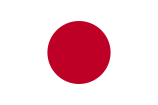 Kitakyūshū, Japan
Kitakyūshū, Japan Le Havre, France
Le Havre, France Vancouver, Canada
Vancouver, Canada Ohrid, Republic of Macedonia
Ohrid, Republic of Macedonia Bremen, Germany
Bremen, Germany Incheon, South Korea
Incheon, South Korea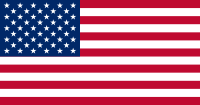 Oakland, California, USA
Oakland, California, USA Houston, Texas, USA
Houston, Texas, USA Rostock, Germany
Rostock, Germany Maizuru, Japan
Maizuru, Japan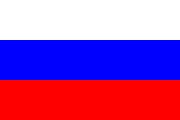 Vladivostok, Russia
Vladivostok, Russia Pointe-Noire, Republic of Congo
Pointe-Noire, Republic of Congo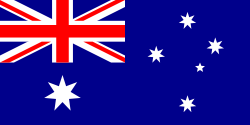 Adelaide, Australia
Adelaide, Australia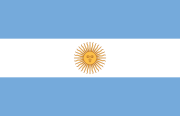 Bahia Blanca, Argentina
Bahia Blanca, Argentina
Environmental protection
Dalian frequently ranks Grade 2 for air pollution according to SEPA.[7]
Plastination center
The German anatomist Gunther von Hagens runs a plastination center in Dalian.
References
- ↑ 1.0 1.1 "Dalian Chief investment portal: 大连投资政务门户网站" (in Chinese). Dalian Foreign Trade and Economic Cooperation Bureau. Retrieved on 2008-07-25.
- ↑ "Work begins on Harbin-Dalian passenger-only rail line", People's Daily Online (2007-08-24).
- ↑ Jing, Fu (2006-01-03). "Beijing drops out of top 10 'best city' list", China Daily.
- ↑ 大連方言について (in Japanese)
- ↑ IMDb Biography
- ↑ Variety Magazine 18 May 2001
- ↑ Air Quality Daily Report for 84 Major Cities In China.
Further reading
- Song Li. Everyday Dalian: Life In Modern Manchuria (Photography Book), Foreword by Phil Borges. 1st edition. DigitalKu. February 08, 2008. ISBN 0-9763168-5-4, ISBN-13: 978-0-9763168-5-5.
- Kuramoto, Kazuko. Manchurian Legacy: Memoirs of a Japanese Colonist, 1st edition. Michigan State University Press. October 1, 1999. ISBN 0870135104, ISBN-13: 978-0870135101.
- Matz, Leigh. Blue Sky Red Tears, 1st edition. DigitalKu. November 30, 2004. ISBN 0976316811, ISBN-13: 978-0976316817.
- McKnight, Tom, (ed.). Geographica: The Complete Illustrated Atlas of the World, 3rd revision. New York: Barnes and Noble Books, 2001. ISBN 0-7607-5974-X, ISBN-13: 9780760727140.
- Theiss, Frank. The Voyage of Forgotten Men, 1st Ed. Indianapolis & New York: Bobbs-Merrill Company, 1937.
External links
- Dalian Government website
- Dalian travel guide from Wikitravel
|
||||||||||||||||||
|
||||||||||
|
||||||||||||||||||||||||
